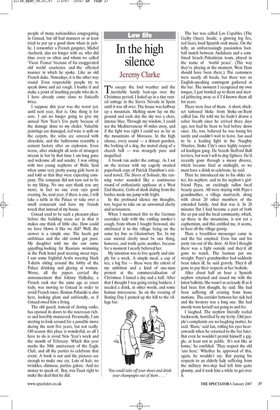In the high silence
Jeremy Clarke To escape the foul weather and the inevitable family bust-ups over the Christmas period, I holed up in a tiny rented cottage in the Sierra Nevada in Spain until it was all over. The house was halfway up a mountain. Melting snow lay on the ground and each day the sky was a clear, intense blue. Through my window, I could see the Mediterranean 40 miles away, and if the light was right I could see as far as the mountains of Morocco. In the high silence, every sound — a distant gunshot, the barking of a dog, the muted clang of a church bell — was strangely pure and magnified.
A brook ran under the cottage. As I sat on the terrace with my eagerly awaited paperback copy of Patrick Hamilton's reissued novel, The Slaves of Solitude, the running water sounded like a continuous round of enthusiastic applause at a West End theatre. Gobs of slush sliding from the bushes made me jump with fright.
In the profound silence my thoughts, too, began to take on an unwonted clarity and seriousness.
When I mentioned this to the German caretaker lady with the rattling smoker's cough, from whom I bought firewood, she attributed it to the village being on the same ley line as Glastonbury Tor. In my case mental clarity must be one thing, however, and truth quite another, because for a moment I nearly believed her.
My intention was to live quietly and simply for a week. A simple meal, a cup of tea, a log fire — these were the extent of my ambition and a kind of one-man protest at the commercialisation of Christmas. I lasted a day and a half. After that I thought I was going raving bonkers. I needed a drink, in other words, and some human intercourse. So on the evening of Boxing Day I panted up the hill to the village bar.
The bar was called Los Cupables (The Guilty Ones). Inside, a glowing log fire, red faces, loud Spanish rock music. On the telly, an embarrassingly passionless football match between Andalusia and a combined Israeli–Palestinian team, played in the name of 'world peace'. (The way they're playing at the moment, West Ham should have been there.) The customers were nearly all locals, but there was an English-speaking contingent gathered at the bar. The moment I recognised my own tongue, I just bowled up to them and started jabbering away as if I'd known them all for years.
There were four of them. A short, thickset tattooed bloke from Stoke-on-Trent called Ian. He told me he hadn't drawn a sober breath since he arrived three days ago, nor had he been to bed before dawn once. He, too, believed he was losing his sanity and couldn't wait to leave. Ian used to be a leading light in the Naughty Nineties, Stoke City's once highly respected hooligan gang. He breeds Stafford Bull terriers, but won't sell to dog fighters. He'd recently gone through a messy divorce, which became final at midnight, so we must have a drink to celebrate, he said.
Then he introduced me to his older sister; his nephew; and to his nephew's girlfriend Pepa, an excitingly sullen local beauty queen. All were staying with Pepa's grandmother, a village matriarch, along with about 20 other members of the extended family. And that was it. In 20 minutes flat I had become a part of both the ex-pat and the local community, which, up there in the mountains, is not yet a euphemism, and this entitled me, it seems, to hear all the village gossip.
Then a breathless messenger came in and the bar emptied. Even Ian and his party ran out of the door. At first I thought there was a fight outside and they'd all gone to watch. The barman put me straight. Pepa's grandmother had suddenly been taken ill, he said gravely. They'd all gone to pay their respects at her bedside.
After about half an hour a Spanish nephew returned and issued me with the latest bulletin. She wasn't as seriously ill as it had been first thought, he said. She had been suffering all evening from loose motions. The corridor between her sick bed and the lavatory was a long one. She had merely worn herself out going to and fro.
I laughed. The nephew literally reeled backwards, horrified by my levity. Old people's complaints are no laughing matter, he said. 'Runs,' said Ian, rolling his eyes heavenwards when he returned to the bar later. But even he wouldn't permit himself a giggle, at least not in public. 'It's not like at home,' he confided. 'They respect the old 'uns here.' Whether he approved of this, again, he wouldn't say. But paying his respects to an elderly lady suffering from the military two-step had left him quite gloomy, and it took him a while to get over it.




































 Previous page
Previous page